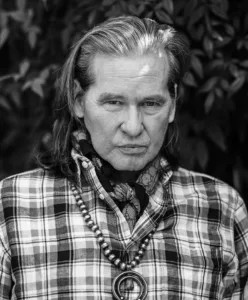
Because of unresolved health issues from his cancer treatment, actor Val Kilmer, 62, will not play Madmartigan in the recently released Disney+ sequel series Willow.
The throat cancer survivor could not participate in Disney+’s relaunch of Willow, where he would have reprised his 1988 portrayal, due to health issues during the pandemic.
“As COVID seized the planet, it became insurmountable,” showrunner Jonathan Kasdan says. “We were preparing in the spring, when it was most prevalent. Furthermore, Val resisted the urge to speak up.”
“We had to find a way to keep the story we wanted to tell him about how his journey was playing out,” he explained.
“I remember seeing Val shortly after this thing got going and saying, ‘Listen, we’re doing this, and the entire world wants Madmartigan back,’” Kasdan continued. “Not as much as I do,” he responded.
“He hugged me as I left. ‘I’m still very strong,’ he said as he drew me up. And I thought, ‘Wonderful.’ We started outlining the first season to have him appear. To be honest, it wasn’t until late in the procedure that we couldn’t get him.”
Despite his decision not to, Kasdan stated that Kilmers has the opportunity to participate in the new series.
“We wanted to commemorate his spirit while also leaving the door open to any future possibilities. We’ve tried to engage with him in a way that allows him to be heard and felt, if not seen,” Kasan explained.
Kilmer was diagnosed with throat cancer in 2015, but he did not speak publicly about it until 2017. His children, Jack, 27, and Mercedes, 30, with his ex-wife, English actress Joanne Whalley, 61, were behind his decision to undergo chemotherapy.
He refused conventional treatment initially because he believed his Christian Science faith would remove the tumors.
Kilmer also underwent a tracheotomy, a medical procedure that connected the windpipe to a hole in the front of the neck, which significantly altered his speaking voice.
However, Kilmer continued to play Iceman due to advances in artificial intelligence technology, which allowed filmmakers to recreate his distinct speech patterns using recordings of him speaking.
Kilmer initially kept his cancer diagnosis a secret. Still, he eventually opened up about it in interviews, his autobiography I’m Your Huckleberry, and his documentary Val, which is now available on Amazon Prime.
“I have been free of cancer for more than four years now, and there has never been any recurrence,” he claimed in I’m Your Huckleberry. “I am extremely grateful.”
Kilmer explained on Twitter how much solace he found in painting due to his voice damage. However, he stated that when one item is removed, another is given.
“My creative juices were boiling over and pouring out of me, but I had no voice to express them. I rediscovered my creative side and resumed my writing and drawing. I had a healing experience with art.”
Kilmer is an accomplished actor who understands the therapeutic value of art. Some people use various artistic pursuits (such as singing, dancing, painting, or crafting) in conjunction with or after cancer treatment.
Some people use art to cope with their emotions after losing a loved one to cancer. It makes no difference when or how you approach art; its therapeutic effects on mental health are well-established and supported.
Indeed, a 2016 study published in the Journal of the American Art Therapy Association found that engaging in creative activities can reduce stress and improve mental health in as little as an hour. That, according to the author, is true regardless of one’s artistic ability or experience.
It is critical to stay informed, even if it is frequently challenging to determine how or why we develop specific types of cancer.
All risk factors for throat cancer include the use of alcohol and cigarettes, as well as the human papillomavirus, or HPV, which is typically associated with women and can cause cervical cancer. The sexually transmitted disease has been linked to throat cancer and can harm both men and women.
Dr. Jessica Geiger of the Cleveland Clinic Cancer Center previously told SurvivorNet that HPV could cause cancer in both men and women. The HPV strains responsible for throat cancer are the same as the viruses responsible for cervical cancer.
Most patients with HPV-related throat cancer are men in their 40s or 50s who never smoked or only smoked occasionally.